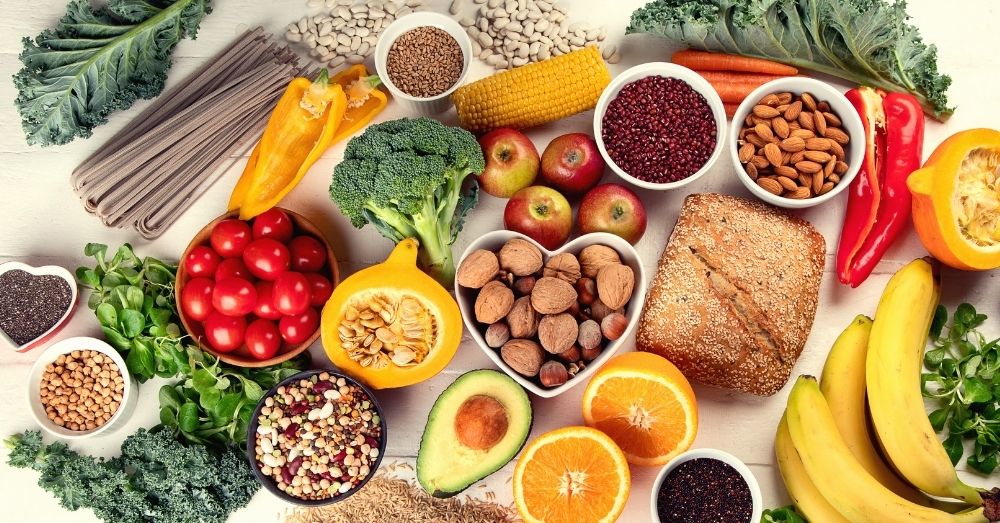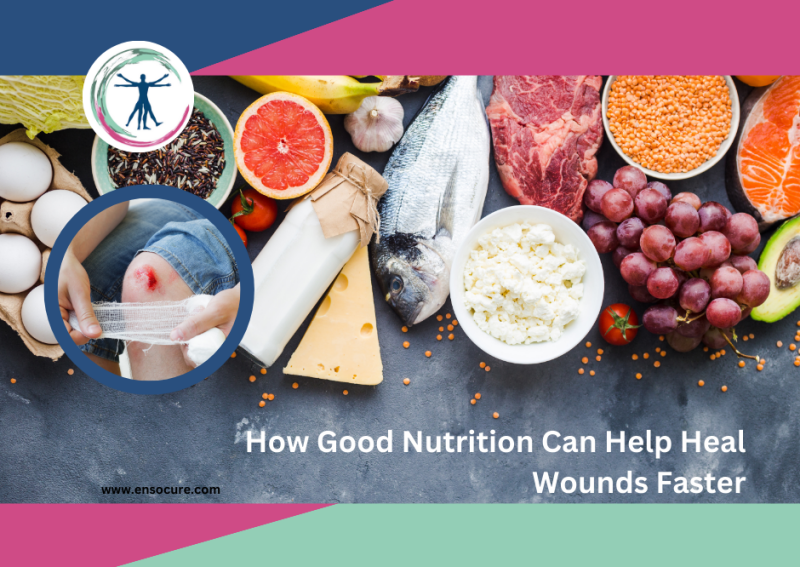Good nutrition helps heal wounds faster playing a critical role in tissue repair and fighting infection. During the healing process, your body requires an increased intake of calories, protein, fluids, vitamin A, vitamin C, and zinc. Food is the best source of these essential nutrients. However, if your dietary intake is insufficient, supplementation may be necessary. Consult your nutritionist about incorporating a nutrition supplement drink or a multi-vitamin pill into your regimen. Before following these tips to heal wounds faster, consult your doctor or dietician especially if you have specific medical conditions such as diabetes, kidney disease, or fluid restrictions.
Eat a Variety of Healthy Foods to Heal Wounds Faster

Choose foods from the 4 food groups at meals and snacks:
• Vegetables and Fruit
• Grain Products
• Milk and Alternatives
• Meat and Alternatives
Calories
Wounds are always hungry and calories are the best way to feed them. During the wound healing process, your body requires additional calories, which serve as essential energy derived from food. It’s crucial to maintain an adequate calorie intake to prevent unintentional weight loss. If you have a small appetite, consider smaller, more frequent meals throughout the day, and incorporate nutritious snacks between meals.
Calories provide energy for bodily functions and heals wounds faster as part of the repair process. Carbohydrates and fats are the primary sources of energy for the human body, including wound repair. Collagen synthesis, a key aspect of wound healing, demands significant energy. The energy requirements for healing escalate in proportion to the size and complexity of the wound. Incorporating “High Energy” foods into your diet can be particularly beneficial for individuals with wounds.
Consider fresh or frozen fruits, multigrain breads, and whole grain pastas, rice, and starchy vegetables. High fat foods like dairy during wound recovery are also beneficial for wound healing. If you’re struggling to consume enough food or experiencing weight loss, consult your dietitian for personalized meal and snack suggestions that are higher in calories and easy to prepare.
Protein
Protein plays a pivotal role in muscle building, tissue repair, and immune function. If illness or treatment affects your appetite, prioritizing protein-rich foods can help fulfill your protein needs and maintain muscle mass. Your body needs enough energy to use the protein in food to protect your skin and heal wounds faster. Protein foods can also be a good source of minerals such as iron and zinc that are needed in wound healing. Foods rich in protein include:
- Eggs
- Meat, fish, poultry
- Fortified soy
- Nuts, seeds
- Milk
- Yoghurt
- Cheese, cottage cheese,
- Beans, lentils, tofu
- Protein powders (whey, soy, collagen, pea, hemp, or skim milk
- powder)
When To Take More Protein?
You may need to eat more protein if you:
• Are Sick
• Receive Treatment for Cancer
• Take Certain Medicines
• Live With a Chronic Illness
• Are Recovering from Surgery
How Much Protein Do I Need Daily?
According to the latest dietary guidelines set by the ICMR ( Indian Council of Medical Research), the recommended protein intake for an average Indian man is 54 g/d or 0.8gm to 1gm per kilogram of body weight and for an average Indian woman is 46 g/d, while for children, the recommended daily protein intake is equal for boys and girls up to 9 years of age. While global protein intake is increasing, India still has the lowest average protein consumption (at 47gm per person per day).
Fluid
Wounds get thirsty. Hydration is essential for optimal healing. While water is the best source of fluid, incorporating milk or smoothies can be beneficial, particularly if your appetite is diminished. Plan your fluid intake throughout the day to prevent dehydration, and consider consuming fluids between meals to stimulate appetite. Most adults need 9–12 cups (2.25–3 L) of fluid each day. Keep a glass of water or water bottle near you all day and sip it continuously. Best sources of fluid are:
- Water
- Milk Or Fortified Soy Beverage
- 100% Fruit or Vegetable Juice
- Soup
- Coffee Or Tea
Fats
Fats, including mono- and polyunsaturated fats, serve as essential energy sources for wound healing. Adequate fat intake is crucial to prevent the utilization of protein for energy purposes. Incorporating sources of healthy fats such as meat, full-fat dairy products like butter, cheese, cream, ice-cream and cooking oils and fats can support the healing process.
It’s important to aim for weight maintenance during wound healing. Individuals who are overweight should refrain from weight loss efforts until their wounds have fully healed, while those who are underweight should strive to attain a healthy weight range to optimize healing outcomes.
Vitamins and Minerals
Vitamins and minerals are essential to heal wounds faster and improving your immune system. Eating a healthy variety of foods should provide you your daily intake of vitamins and minerals such as zinc, vitamin A and C, important for your wound healing diet. Here are the best vitamins and minerals for wound healing.
L-Arginine and Glutamine
L-Arginine, an amino acid is essential for protein synthesis and possesses properties to facilitate certain pathways crucial for wound healing. Your body’s protein requirements escalate during the healing process, during which non-essential amino acids like L-Arginine, become essential. Research indicates that dietary supplementation with arginine can improve protein metabolism, prevent muscle loss, and contribute to collagen synthesis helping the body in the wound healing process.
Glutamine, the most abundant amino acid in our bodies is integral to wound healing especially when it comes to healing the gut. Glutamine is well known as a gut protective agent that supports gut microbiome, gut mucosal wall integrity, and modulating inflammatory responses.
Vitamin C
Vitamin C is important for collagen synthesis and formation of new blood vessels (angiogenesis). Adequate Vitamin C levels will help strengthen the healing wound and prevent infection. Research has shown vitamin C supplementation helps promote pressure ulcer healing.
Foods with vitamin C:
- Broccoli
- Brussels Sprouts
- Cantaloupe
- Citrus Fruits (Oranges)
- Kiwi
- Papaya
- Strawberries
- Sweet Bell Pepper
- Tomatoes
- 100% Fruit Juice
Vitamin A
Vitamin A promotes the inflammatory response within wounds, thereby stimulating collagen synthesis. Inadequate levels of vitamin A may lead to delayed wound healing and make you prone to infections. Be careful about considering vitamin A supplementation due to the potential risk of toxicity. Do so only after consulting a doctor.
Foods with vitamin A:
- Apricot
- Cantaloupe
- Carrots
- Cheese
- Eggs
- Leafy Greens
- Liver
- Mango
- Milk
- Papaya
- Pumpkin
- Sweet Potato
Zinc
Zinc, a trace element, plays an important role in wound healing and contributes to protein, collagen synthesis, tissue growth and healing. Foods rich in zinc are:
- Eggs
- Fish
- Legumes (Beans, Lentils)
- Liver
- Meat
- Milk
- Nuts And Seeds
- Poultry
- Seafood (Oysters, Crab, Clams)
- Whole Grain Foods (Brown Rice, Cereals, Oatmeal, Barley)
Iron
Iron improves hemoglobin and provides oxygen to the site of the wound to speed up healing. An iron (hemoglobin) deficiency can impair healing and result in poor collagen production. The best sources of iron in the diet are:
- Red Meat
- Fish,
- Eggs,
- Wholemeal Bread,
- Dark Green Leafy Vegetables,
- Dried Fruits,
- Nuts
Diabetes and wound healing
Maintaining your blood sugar is important in wound healing especially for those suffering from any type of diabetes. Good blood sugar control helps heal wounds faster reducing the risk of infection. To know more on a diabatic diet, and wound healing, consult your dietician for tips to manage blood sugar.
Top Tips for Getting the Nutrition You Need
- Use full-fat dairy products such as yogurt, milk, or cheese.
- Add lentils or beans to soups.
- Cook hot cereals with milk or soy milk.
- Add olive oil to smoothies, pasta, or cooked vegetables.
- Snack on nuts and seeds. Add nut butters to crackers or fruit
- Eat cottage cheese or Greek yogurt
- Grate healthy varieties of cheese onto vegetables.
- Add grilled fish to salads or pasta.
- Sprinkle raisins or dried cranberries onto to cereals, salads, or yogurt
Takeaway
Optimizing nutrition is important in wound management to make wounds heal faster. Your overall goals should be to ensure you’re eating a healthy diet with optimum nutritional intake, to give wounds the best chance to heal. While vitamins and minerals mentioned here are indeed beneficial for wound healing, it is advisable to consult your dietician or doctor on the dosage, and never self-medicate. Toxicity is known to occur in overdosage.

